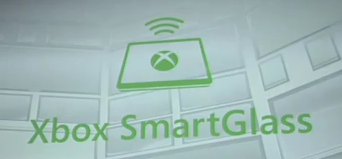During E3 2012 Microsoft unveiled what arguably stole the show, their new platform SmartGlass. In a press conference devoid of new hardware, Microsoft managed to garner interest and attention for what amounts to an app. In convincing fashion SmartGlass for entertainment is born.
Now we could bog you down with lengthy details about demos and hands on information, but demos are what they are and they’re intended to offer a glimpse at products. So instead, we’re going to offer more direct information about SmartGlass. Get ready, this stuff is cool!
SmartGlass For Entertainment
SmartGlass for Movies and TV
Picture one of your favorite DVDs, all of its extras and behind the scenes content. Now envision all those features as available at the same time. That’s what SmartGlass promises to deliver. SmartGlass will take the movie extras and display them on your alternate device while watching the movie on your large screen TV. Microsoft themselves used the Game of Thrones example, where map details are shown on a tablet or smartphone while the series displays on TV.
Microsoft also stated that SmartGlass will enable users to move video between devices, meaning users can start watching a video on a mobile device, pause, and continue the movie on their home television through the Xbox.
The big if in all of this is content providers and Microsoft partners. Providers and partners of Microsoft’s absolutely must be on board or it won’t matter how awesome SmartGlass is, without the content it will be another useless bullet point.
SmartGlass for Games
Clearly we can’t talk about an extension of the Xbox’s power without describing any gaming potential. Aside from the obvious map display on secondary screens, developers can push their games focus more towards constant action rather than play/pause/play scenarios. With SmartGlass players will potentially have access to play calling in sports games, inventory displays, maps and a dual screen for gameplay.
This particular use of SmartGlass seems the most likely to succeed. It is comparable to the WiiU in terms of output, but makes WiiU seem like a novelty when you factor in that Microsoft promises the SmartGlass app will work on all Windows, iOS and Android mobile devices.
SmartGlass for the Web
We’ve touched on this already and it’s definitely worth mentioning again. Xbox owners will finally be able to surf the web directly from the Xbox. In order to accomplish this, successfully, Microsoft needed two things. First, a browser for Xbox. Not a problem, they’re going to use Internet Explorer. Second, a way for users to conveniently and comfortably navigate the web. Their answer is SmartGlass.

There have been a number of attempts in recent years to bring the web to the television. All have failed. While there’s no one specific reason, the glaring cause is the need for a keyboard and mouse for navigation. Users don’t want to have those things at bedside or cluttering every end table in the house. SmartGlass eliminates the need for a physical keyboard and mouse. The SmartGlass app turns your mobile devices (tablets, smartphones) into a mouse and uses the built-in keyboard for navigation.
SmartGlass promises to be the perfect fit and if the app is stable, we have no argument with that promise. Microsoft looks to leap ahead of Apple, Google and anyone else who’ve tried to put the internet on a television. We believe this is the best hope so far for a success.
Final Thoughts
In combination with Kinect and voice control, SmartGlass could definitely turn the Xbox into the premier entertainment device for homes. There are still some things to be worked out such as content partners participation, app stability and access across devices, the Xbox itself – can it handle all the power it promises? All valid questions. The recent leaked information about Microsoft’s next-gen Xbox likely solves the last of those questions and we believe, at least initially, that movie and tv partners will jump on board.
Our conclusion is that SmartGlass is poised to be a success, but it has to get out of the gates without stumbling or users could get turned off quickly while competitors eagerly try to mimic the concept.
If you enjoyed or found this article useful, please show us some support by liking us on Facebook or by sharing us on your favorite social website. Thanks!

